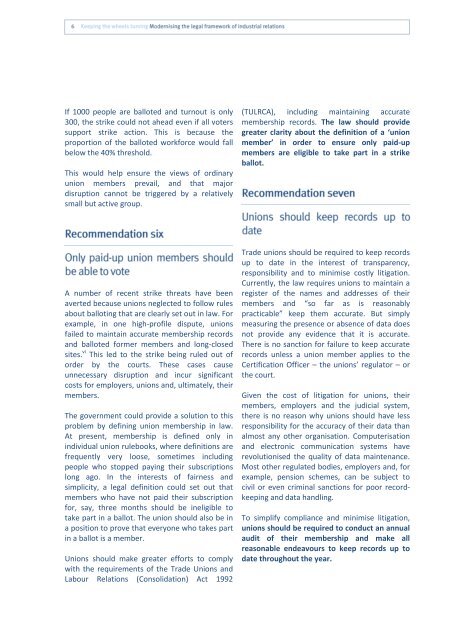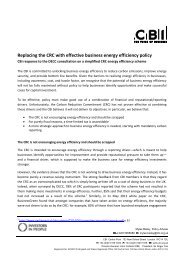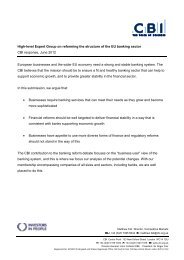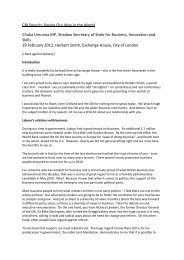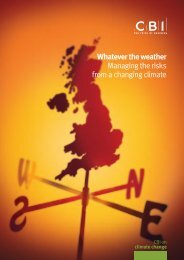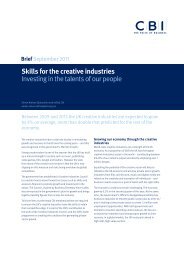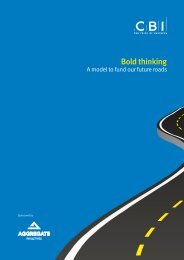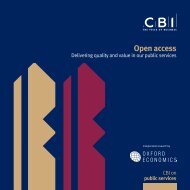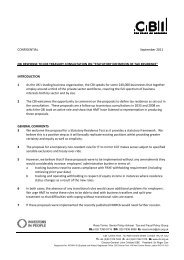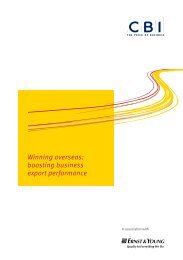Read the full policy brief (pdf) - CBI
Read the full policy brief (pdf) - CBI
Read the full policy brief (pdf) - CBI
Create successful ePaper yourself
Turn your PDF publications into a flip-book with our unique Google optimized e-Paper software.
If 1000 people are balloted and turnout is only300, <strong>the</strong> strike could not ahead even if all voterssupport strike action. This is because <strong>the</strong>proportion of <strong>the</strong> balloted workforce would fallbelow <strong>the</strong> 40% threshold.This would help ensure <strong>the</strong> views of ordinaryunion members prevail, and that majordisruption cannot be triggered by a relativelysmall but active group.(TULRCA), including maintaining accuratemembership records. The law should providegreater clarity about <strong>the</strong> definition of a ‘unionmember’ in order to ensure only paid-upmembers are eligible to take part in a strikeballot.A number of recent strike threats have beenaverted because unions neglected to follow rulesabout balloting that are clearly set out in law. Forexample, in one high-profile dispute, unionsfailed to maintain accurate membership recordsand balloted former members and long-closedsites. vi This led to <strong>the</strong> strike being ruled out oforder by <strong>the</strong> courts. These cases causeunnecessary disruption and incur significantcosts for employers, unions and, ultimately, <strong>the</strong>irmembers.The government could provide a solution to thisproblem by defining union membership in law.At present, membership is defined only inindividual union rulebooks, where definitions arefrequently very loose, sometimes includingpeople who stopped paying <strong>the</strong>ir subscriptionslong ago. In <strong>the</strong> interests of fairness andsimplicity, a legal definition could set out thatmembers who have not paid <strong>the</strong>ir subscriptionfor, say, three months should be ineligible totake part in a ballot. The union should also be ina position to prove that everyone who takes partin a ballot is a member.Unions should make greater efforts to complywith <strong>the</strong> requirements of <strong>the</strong> Trade Unions andLabour Relations (Consolidation) Act 1992Trade unions should be required to keep recordsup to date in <strong>the</strong> interest of transparency,responsibility and to minimise costly litigation.Currently, <strong>the</strong> law requires unions to maintain aregister of <strong>the</strong> names and addresses of <strong>the</strong>irmembers and “so far as is reasonablypracticable” keep <strong>the</strong>m accurate. But simplymeasuring <strong>the</strong> presence or absence of data doesnot provide any evidence that it is accurate.There is no sanction for failure to keep accuraterecords unless a union member applies to <strong>the</strong>Certification Officer – <strong>the</strong> unions’ regulator – or<strong>the</strong> court.Given <strong>the</strong> cost of litigation for unions, <strong>the</strong>irmembers, employers and <strong>the</strong> judicial system,<strong>the</strong>re is no reason why unions should have lessresponsibility for <strong>the</strong> accuracy of <strong>the</strong>ir data thanalmost any o<strong>the</strong>r organisation. Computerisationand electronic communication systems haverevolutionised <strong>the</strong> quality of data maintenance.Most o<strong>the</strong>r regulated bodies, employers and, forexample, pension schemes, can be subject tocivil or even criminal sanctions for poor recordkeepingand data handling.To simplify compliance and minimise litigation,unions should be required to conduct an annualaudit of <strong>the</strong>ir membership and make allreasonable endeavours to keep records up todate throughout <strong>the</strong> year.


